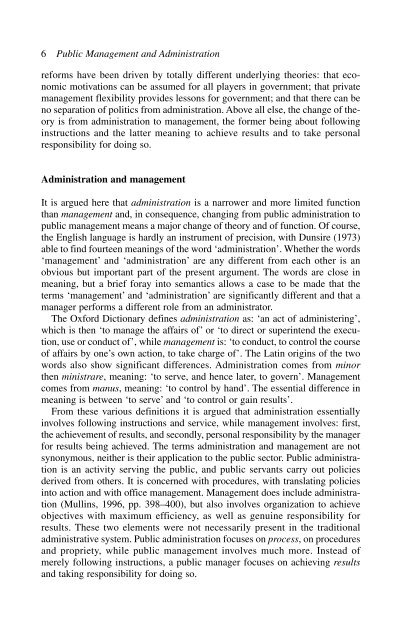Public Management and Administration - Owen E.hughes
Public Management and Administration - Owen E.hughes
Public Management and Administration - Owen E.hughes
Create successful ePaper yourself
Turn your PDF publications into a flip-book with our unique Google optimized e-Paper software.
6 <strong>Public</strong> <strong>Management</strong> <strong>and</strong> <strong>Administration</strong><br />
reforms have been driven by totally different underlying theories: that economic<br />
motivations can be assumed for all players in government; that private<br />
management flexibility provides lessons for government; <strong>and</strong> that there can be<br />
no separation of politics from administration. Above all else, the change of theory<br />
is from administration to management, the former being about following<br />
instructions <strong>and</strong> the latter meaning to achieve results <strong>and</strong> to take personal<br />
responsibility for doing so.<br />
<strong>Administration</strong> <strong>and</strong> management<br />
It is argued here that administration is a narrower <strong>and</strong> more limited function<br />
than management <strong>and</strong>, in consequence, changing from public administration to<br />
public management means a major change of theory <strong>and</strong> of function. Of course,<br />
the English language is hardly an instrument of precision, with Dunsire (1973)<br />
able to find fourteen meanings of the word ‘administration’. Whether the words<br />
‘management’ <strong>and</strong> ‘administration’ are any different from each other is an<br />
obvious but important part of the present argument. The words are close in<br />
meaning, but a brief foray into semantics allows a case to be made that the<br />
terms ‘management’ <strong>and</strong> ‘administration’ are significantly different <strong>and</strong> that a<br />
manager performs a different role from an administrator.<br />
The Oxford Dictionary defines administration as: ‘an act of administering’,<br />
which is then ‘to manage the affairs of’ or ‘to direct or superintend the execution,<br />
use or conduct of’, while management is: ‘to conduct, to control the course<br />
of affairs by one’s own action, to take charge of’. The Latin origins of the two<br />
words also show significant differences. <strong>Administration</strong> comes from minor<br />
then ministrare, meaning: ‘to serve, <strong>and</strong> hence later, to govern’. <strong>Management</strong><br />
comes from manus, meaning: ‘to control by h<strong>and</strong>’. The essential difference in<br />
meaning is between ‘to serve’ <strong>and</strong> ‘to control or gain results’.<br />
From these various definitions it is argued that administration essentially<br />
involves following instructions <strong>and</strong> service, while management involves: first,<br />
the achievement of results, <strong>and</strong> secondly, personal responsibility by the manager<br />
for results being achieved. The terms administration <strong>and</strong> management are not<br />
synonymous, neither is their application to the public sector. <strong>Public</strong> administration<br />
is an activity serving the public, <strong>and</strong> public servants carry out policies<br />
derived from others. It is concerned with procedures, with translating policies<br />
into action <strong>and</strong> with office management. <strong>Management</strong> does include administration<br />
(Mullins, 1996, pp. 398–400), but also involves organization to achieve<br />
objectives with maximum efficiency, as well as genuine responsibility for<br />
results. These two elements were not necessarily present in the traditional<br />
administrative system. <strong>Public</strong> administration focuses on process, on procedures<br />
<strong>and</strong> propriety, while public management involves much more. Instead of<br />
merely following instructions, a public manager focuses on achieving results<br />
<strong>and</strong> taking responsibility for doing so.











